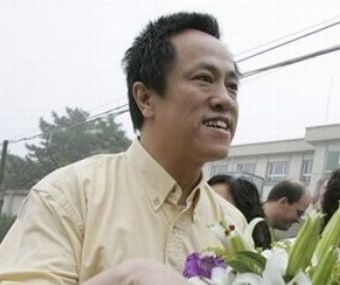
Publisher:
Bonnie King
CONTACT:
Newsroom@Salem-news.com
Advertising:
Adsales@Salem-news.com

~Truth~
~Justice~
~Peace~
TJP
Apr-16-2008 20:30

 TweetFollow @OregonNews
TweetFollow @OregonNews
Chinese Journalist Calls for Press Freedom on Release from Jail
Salem-News.comZhao said his time in jail had affected him deeply. “But I believe that suffering is also a very valuable thing in a human life,” he said.
 New York Times researcher Zhao Yan |
(HONG KONG) - A Beijing-based news researcher for The New York Times and cutting-edge Chinese investigative reporter has called for greater press freedom in China following his release from a three-year jail term, Radio Free Asia reports.
“There is not enough press freedom now,” Zhao Yan, who was jailed for fraud after charges of “revealing state secrets” were withdrawn, told RFA’s Mandarin service. “A law enshrining such freedoms should be enacted,” he told reporter Xin Yu shortly before leaving for the United States.
Zhao was initially accused of “revealing state secrets” after The New York Times correctly predicted the retirement of then president Jiang Zemin. He was fired from a previous reporting job with the magazine China Reform for reporting on a grassroots campaign against a reservoir project in northern China.
Zhao was arrested in 2004 and charged with leaking state secrets. That charge was dropped but he was convicted of defrauding an official of U.S. $2,500, which he denies. He was released from prison in September 2007 but hasn’t spoken publicly until now.
He also lashed out at Beijing’s handling of the recent unrest in Tibet and its human rights violations around the Olympic Games, which China will host this summer.
“I think on the ideological side of things, they could improve some of their concepts—for example, the ‘Humane Olympics’ concept, the ‘Green Olympics’ concept and the ‘Hi-Tech Olympics’ concept. The Humane Olympics concept especially could do with improvement,” Zhao said.
He cited the case of Heilongjiang petitioner Liu Jie, still in detention after being dragged back from Beijing where she was attempting to lodge an official complaint against the Supreme People’s Procuratorate and the State Council in October.
In Tibet, he said the Chinese government was using “outdated” methods to impose its rule, although he said he doesn’t support Tibetan independence.
“I think that the government needs to improve its techniques for handling these sorts of problems as they occur in the day-to-day life of modern Chinese society,” Zhao said. “It doesn’t work to rely on these outdated Maoist methods any more.”
“I am against any sort of violence. I believe that such problems can be solved through non-violent means, by sitting down and talking about them,” he said. “I would say that Tibet doesn’t belong only to Tibetans, but also to the Chinese people.”
Zhao, who said he noticed Beijing had become much smarter and more updated in its infrastructure in the run-up to the Games, said he planned to visit The New York Times and follow the Democratic presidential nomination race between Hillary Clinton and Barack Obama while in the United States.
Treated well in prison
He said he had enjoyed comparatively good conditions while in a state security police detention center in Beijing.
“Apart from the limitations placed on my personal freedom, which obviously amounts to mistreatment, I think it’s safe to say that the conditions at the state security police detention center in Beijing are generally much better than other detention centers,” he said.
“At least I was able to read every day. I read a lot of books in prison...It was the best way to dissolve all the unhappiness.”
Zhao said his time in jail had affected him deeply. “But I believe that suffering is also a very valuable thing in a human life,” he said.
Controversial reporting
Before joining The New York Times, Zhao had already drawn attention to himself with his reporting on the plight of some 20,000 peasants who were relocated in the 1990s to make way for the Taolinkou reservoir in Hebei province.
He lost his job after more than 11,000 farmers submitted a petition to the National People’s Congress.
Zhao’s call for press freedom comes shortly after similar comments by a former head of the Chinese Communist Party’s powerful propaganda department, which tightly controls all media, dictating which subjects are to be highlighted and which forbidden because of political sensitivities.
Zhu Houze, who served in the job during the early years of the Deng Xiaoping era of economic reform, also rejected a revolutionary mentality in dealing with the problems of today’s China.
----------------------------------------------------------
Original reporting in Mandarin by Xin Yu. RFA Mandarin service director: Jennifer Chou. Translated and written for the Web in English by Luisetta Mudie. Edited by Sarah Jackson-Han.
Source: Radio Free Asia, a private, nonprofit corporation that broadcasts news and information in nine East Asian languages to listeners who do not have access to full and free news media. The purpose of RFA is to provide a forum for a variety of opinions and voices from within these Asian countries.
Articles for April 15, 2008 | Articles for April 16, 2008 | Articles for April 17, 2008

googlec507860f6901db00.html

Salem-News.com:


Terms of Service | Privacy Policy
All comments and messages are approved by people and self promotional links or unacceptable comments are denied.
[Return to Top]
©2026 Salem-News.com. All opinions expressed in this article are those of the author and do not necessarily reflect those of Salem-News.com.